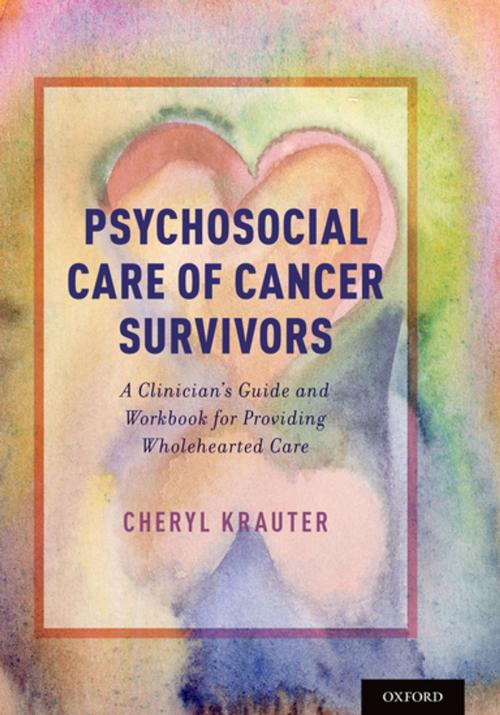Psychosocial Care of Cancer Survivors
A Clinician's Guide and Workbook for Providing Wholehearted Care
Nonfiction, Health & Well Being, Medical, Specialties, Oncology, Psychiatry, Psychology, Psychotherapy| Author: | Cheryl Krauter | ISBN: | 9780190636388 |
| Publisher: | Oxford University Press | Publication: | June 14, 2018 |
| Imprint: | Oxford University Press | Language: | English |
| Author: | Cheryl Krauter |
| ISBN: | 9780190636388 |
| Publisher: | Oxford University Press |
| Publication: | June 14, 2018 |
| Imprint: | Oxford University Press |
| Language: | English |
Currently there is a crisis occurring in healthcare involving clinician burnout, emotional exhaustion, lack of inspiration, and loss of personal meaning. For clinicians caring for cancer survivors, these feelings are aggravated by facing the largely unknown realm of survivorship and the issues it brings to patients and clinicians alike. As the number of cancer survivors grows, psychosocial oncology clinicians are increasingly called upon to work with the long-term aftermath of a cancer diagnosis, which requires the capacity to address the emotional and psychosocial issues that are not part of a traditional medical education. Clinicians have plenty of textbooks, but fewer hands-on, interactive guides that teach these kinds of experiential lessons that can be used in their day-to-day work lives. This accessible workbook offers a way to think about these important ideas while providing a structure to implement humanistic clinical practices. Clinical skills, communication tools, empathy as a learned capacity, cultural humility, reflective and mindful exercises designed to increase relationship skills-all of these depend upon this mode of experiential learning, as it teaches useful practices and solutions in order to increase the efficacy and satisfaction of clinical work with cancer survivors and their communities. Psychosocial Care of Cancer Survivors: A Clinician's Guide and Workbook for Providing Wholehearted Care is a clinical resource for healthcare practitioners that presents person-centered care as an antidote to the distress both patients and clinicians face in cancer survivorship. It addresses questions of how to bring a humanistic approach and quality attention to the growing needs of patients in the post-treatment phase of a cancer diagnosis. As a workbook, it's both a guide and an applicable resource for daily clinical practice. It provides a needed structure for clinicians to help them reconnect with the meaningful aspects of their work. Designed for busy psychosocial oncology clinicians who may feel disconnected but don't fully understand why, this workbook addresses the need for a humanistic and pragmatic approach to the psychosocial issues that arise in their work with patients. Based on personal interviews with clinicians, written feedback from clinicians, and research describing the formidable demands facing professionals working in cancer healthcare, as well as the dangers of burnout, this is highly practical, interactive guide addresses the emotional and psychological concerns of both patient and clinician. This workbook will be a much-needed resource for humanizing cancer survivorship care. The book is presented in two parts: - Part I focuses on skillful means for providing humanistic patient care. - Part II offers clinicians pragmatic structures and methods they can start using with patients right away, and provides a humanistic clinical framework that benefits them both personally and professionally. Clinicians will gain: - Clinical skills vital to forming healing clinical relationships: - Communication tools to enhance effective collaboration, such as personal and professional boundaries, the essentials of a healing relationship, stages of the clinical interview, collegial collaboration. - Exercises designed for personal reflection and the implementation of the abovementioned clinical skills and communication tools. - Useful practices and solutions to increase the efficacy and satisfaction of their work. Written from the perspective of a clinician-survivor, Psychosocial Care of Cancer Survivors is about the healing power of relationship for both patient and practitioner as they negotiate the complex world of cancer survivorship.
Currently there is a crisis occurring in healthcare involving clinician burnout, emotional exhaustion, lack of inspiration, and loss of personal meaning. For clinicians caring for cancer survivors, these feelings are aggravated by facing the largely unknown realm of survivorship and the issues it brings to patients and clinicians alike. As the number of cancer survivors grows, psychosocial oncology clinicians are increasingly called upon to work with the long-term aftermath of a cancer diagnosis, which requires the capacity to address the emotional and psychosocial issues that are not part of a traditional medical education. Clinicians have plenty of textbooks, but fewer hands-on, interactive guides that teach these kinds of experiential lessons that can be used in their day-to-day work lives. This accessible workbook offers a way to think about these important ideas while providing a structure to implement humanistic clinical practices. Clinical skills, communication tools, empathy as a learned capacity, cultural humility, reflective and mindful exercises designed to increase relationship skills-all of these depend upon this mode of experiential learning, as it teaches useful practices and solutions in order to increase the efficacy and satisfaction of clinical work with cancer survivors and their communities. Psychosocial Care of Cancer Survivors: A Clinician's Guide and Workbook for Providing Wholehearted Care is a clinical resource for healthcare practitioners that presents person-centered care as an antidote to the distress both patients and clinicians face in cancer survivorship. It addresses questions of how to bring a humanistic approach and quality attention to the growing needs of patients in the post-treatment phase of a cancer diagnosis. As a workbook, it's both a guide and an applicable resource for daily clinical practice. It provides a needed structure for clinicians to help them reconnect with the meaningful aspects of their work. Designed for busy psychosocial oncology clinicians who may feel disconnected but don't fully understand why, this workbook addresses the need for a humanistic and pragmatic approach to the psychosocial issues that arise in their work with patients. Based on personal interviews with clinicians, written feedback from clinicians, and research describing the formidable demands facing professionals working in cancer healthcare, as well as the dangers of burnout, this is highly practical, interactive guide addresses the emotional and psychological concerns of both patient and clinician. This workbook will be a much-needed resource for humanizing cancer survivorship care. The book is presented in two parts: - Part I focuses on skillful means for providing humanistic patient care. - Part II offers clinicians pragmatic structures and methods they can start using with patients right away, and provides a humanistic clinical framework that benefits them both personally and professionally. Clinicians will gain: - Clinical skills vital to forming healing clinical relationships: - Communication tools to enhance effective collaboration, such as personal and professional boundaries, the essentials of a healing relationship, stages of the clinical interview, collegial collaboration. - Exercises designed for personal reflection and the implementation of the abovementioned clinical skills and communication tools. - Useful practices and solutions to increase the efficacy and satisfaction of their work. Written from the perspective of a clinician-survivor, Psychosocial Care of Cancer Survivors is about the healing power of relationship for both patient and practitioner as they negotiate the complex world of cancer survivorship.















